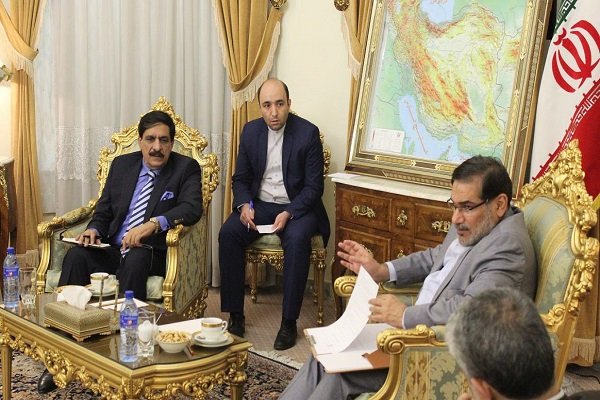While U.S. President Donald Trump’s opening tweet of 2018 took a shot across the bow to Pakistan, it also created an opportunity for it to increase ties with its neighbor and U.S. regional rival Iran.
"The United States' dishonest, duplicitous and divisive policy towards Muslim countries, including Iran and Pakistan, requires that they bolster cooperation against America in addition to maintaining vigilance and taking preventive measures," Iran's Secretary of Supreme National Security Council Ali Shamkhani told a meeting with Pakistani National Security Adviser Lt-Gen Nasser Khan Janjua in Tehran on Sunday, according to reporting by IRIB news agency.
In his New Year’s Day morning tweet, Trump said the U.S. would be withholding military assistance payments to Pakistan.
"The United States has foolishly given Pakistan more than 33 billion dollars in aid over the last 15 years, and they have given us nothing but lies & deceit, thinking of our leaders as fools. They give safe haven to the terrorists we hunt in Afghanistan, with little help. No more!”, Trump wrote.
Trump’s remarks were followed the following day by statements made at the UN in New York by Ambassador Nikki Haley.
“The administration is withholding $255 million in assistance to Pakistan. There are clear reasons for this. Pakistan has played a double game for years,” Haley told reporters on January 2. “They work with us at times, and they also harbor the terrorists that attack our troops in Afghanistan.”
A defensive posture against Washington is not emanating from Islamabad alone. After a week of anti-government protests in Iran, officials there believe the U.S. is behind the unrest, with blame being laid on everything from policies to social media apps.
Iran’s Supreme Leader, Ayatollah Ali Khamenei on Tuesday said the U.S. and Israel have concocted “carefully organized” plot to overthrow Iran’s government.
This great, coherent people’s movement against the enemies’ conspiracy, with such organization, awareness, and enthusiasm is unique among the world, and it continues for forty years now,” Ayatollah Ali Khamenei said, according to a statement posted to the English version of his official website, and in which he was approximating the number of years that have passed since the 1979 Islamic Revolution.
“It’s not simply a question of a number of years. It is a fight of a nation against an anti-nation; a fight of Iran against anti-Iran; a fight of Islam against anti-Islam: this has always existed and will persists,” Khamenei said, speaking from Quom.
Iran and Pakistan share a 909 km (565 mi) long border, which is often the site of dissent and unrest. Baluch separatists have launched attacks from the area, and drug trafficking, particularly of heroine produced from Afghan poppies, is not unknown. The area also suffers from weapons and human trafficking.
In expressing a sense of unity, and shared frustration with the U.S., Shamkhani underlined the need to jointly tackle border issues, and for Muslim countries to exercise what he called “vigilance” against alleged foreign conspiracies hatched to increase rifts among them.
"We will not allow some countries to influence the relations between Iran and Pakistan by sending weapons and renting terrorists to create insecurity on the border,” he said.
Nasser Khan Janjua's visit to Iran came at a time when Pakistan’s Foreign Minister Khawaja Asif questioned the ties between Islamabad and Washington.
“We do not have any alliance," Asif said in an interview with the Wall Street Journal. "This is not how allies behave," he added, referring to US President Donald Trump's decision to suspend financial assistance to Pakistan.
Discussing on the phone regional issues against the backdrop of recent developments, Iranian and Pakistani defense ministers also denounced US President Donald Trump’s verbal attacks on their countries and vowed to beef up defense cooperation.
“The Americans always blame others for their own failures in different parts of the world and follow the strategy of the Zionist regime to destabilize the region,” Iranian Defense Minister Brigadier General Ali Hatami told his Pakistani counterpart Khurram Dastgir-Khan.
Blaming the U.S. for the “deteriorating security situation in Afghanistan and the deaths of innocent civilians in Afghanistan, Yemen, Iraq and Syria on a daily basis,” Ali Hatami called for boosting economic relations and security.







 Azerbaijan and Armenia started the process of demarcation of their border on Tuesday, with the installation of the first border markers based on ge...
Azerbaijan and Armenia started the process of demarcation of their border on Tuesday, with the installation of the first border markers based on ge...
 President Aliyev emphasized the critical role of the North-South Transport Corridor in fostering transport cooperation between Azerbaijan and Russi...
President Aliyev emphasized the critical role of the North-South Transport Corridor in fostering transport cooperation between Azerbaijan and Russi...
 Armenian sappers commenced on Monday mine-clearance operations in the territories adjacent to the Saint Mary Church in village of Voskepar (Armenia...
Armenian sappers commenced on Monday mine-clearance operations in the territories adjacent to the Saint Mary Church in village of Voskepar (Armenia...
 Russian Foreign Minister Sergei Lavrov has reasserted that Moscow has no intentions to stop the fighting in Ukraine, even if peace talks commence.
Russian Foreign Minister Sergei Lavrov has reasserted that Moscow has no intentions to stop the fighting in Ukraine, even if peace talks commence.



